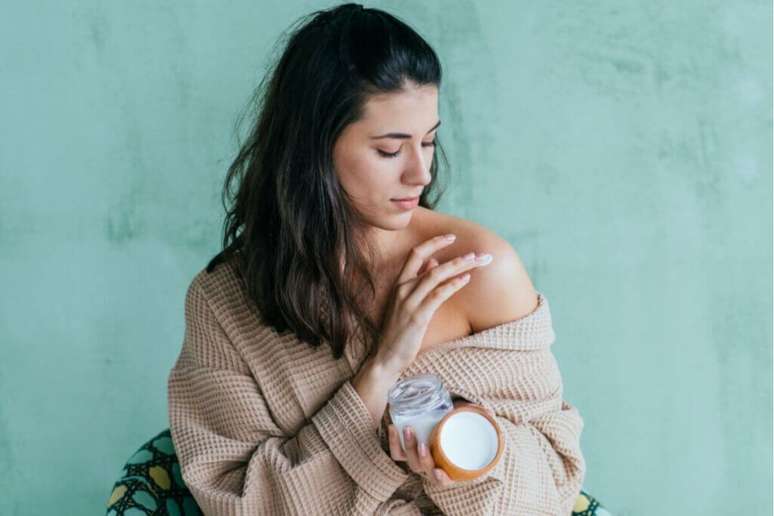The dermatologist explains how some habits are important to avoid dryness
Although it may seem like skin gets drier on cold days, dry weather isn’t the only culprit. “When temperatures drop during the colder months, the humidity in the air also drops, which makes the skin drier, which is further aggravated by certain habits such as hot showers, lack of a skincare routine, and poor diet,” explains dermatologist Dr. Mônica Aribi.
The doctor also explains that the belief that oily skin doesn’t need or can’t be moisturized is a myth. That’s because oiliness is different from hydration. “While the former refers to excess sebum, the latter refers to the amount of water in the skin,” he explains. In addition, acne treatments, for example, dry out the skin a lot, which highlights the need for hydration.
Below, dermatologist Dr. Mônica Aribi lists 8 tips to keep your skin hydrated on cold days. Watch!
1. Apply moisturizing cream and gel
Creams and gels provide immediate relief and prevent transepidermal water loss. “A hydration Through occlusion, the active ingredients present in the cosmetic are able to promote the reduction of water evaporation in the stratum corneum and the maintenance of humidity in the deeper layers, thanks to the presence of oils. It is particularly suitable for dry skin”, says Dr. Mônica Aribi.
The composition of these cosmetics includes amino acids, urea and hyaluronic acid, which are considered organic moisturizers. “The skin that benefits most from this type of action is normal and dry skin. Therefore, it is very important that drier skin opts for richer and more nourishing creams, with omega in association with classic ingredients such as hyaluronic acid. While oily skin should use products that provide prolonged hydration and shine control, generally in versions without oil“, explains the specialist.
two. Be careful with the bathroom
It may be pleasant, but a long, hot shower tends to leave the body even drier skin. “Baths should be short and at the right temperature, or somewhere in between. Take advantage of the minutes after bathing, when your skin is still most receptive, and apply a light layer of body oil, followed by a body cream or lotion. This will help the moisturizer penetrate,” explains the dermatologist.
3. Use a face mask
A hydrating mask can serve as a weekly ritual and will help you unwind. “Masks are helpful because they are occlusive, meaning they forcefully introduce hydrating ingredients into the skin. The same goes for hair,” says the pro.

4. Take care of all areas of the body
There is a simple solution for difficult winter hands, knees, elbows and feet. “The big secret is after exfoliation performed during the showerapply a cream rich in urea, oils such as avocado, macadamia, almond, passion fruit or grape and butters such as shea, cupuaçu or mango”, explains Dr. Mônica Aribi.
According to the dermatologist, in the case of feet, cotton socks can help enhance the action of the active ingredients. “[Deve-se] Wear cotton socks for thirty minutes to increase the absorption of active ingredients and enhance the action of hydration, regeneration and local nutrition”, he specifies. As for the hands, the glove can be an option for occlusion and enhancement of the action of the active ingredients. ingredients.
5. Use lip balm
If your lip is dry, don’t use your tongue! The best thing to do is use a lip balm. “Saliva has a more acidic pH and this leads to constant dermatitis that further worsen the dryness. There is that immediate sensation that the area is moist, but soon after micro-cracks, burning and local redness form,” says the expert.
The doctor recommends the use Vitamin-based moisturizers And provitamin B5, from shea butter and cocoa butter. “They need to be formulations that are rich in vitamins and antioxidants that help repair, to avoid inflammation,” she says.
6. Drink water and eat healthy foods
According to Dr. Mônica Aribi, consuming fruits and vegetables rich in water can help hydrate the skin, as they provide hydration to all the cells of the body. “Internal hydration with adequate water intake and a healthy and natural diet hydrates from the inside. Supplements can also be recommended by doctors,” says the professional.
As the dermatologist explains, most nutricosmetics It has formulas that can help hydrate the skin. “Components such as vitamin E, marine collagen, lycopene and beta-carotene can help both hydration and strengthening the skin barrier. Omega 3, for example, promotes hydration from within,” she says.
7. Improve the air in your room
Along with dry air, the heat from the heater is one of the main factors that reduce hydration. “To solve this problem, place a humidifier in your room. Your skin will thank you in the morning,” explains the dermatologist.
8. Protect your skin from cold wind
Cold wind can quickly evaporate the skin moistureleading to dryness. Protecting it with appropriate clothing reduces this moisture loss. Additionally, the practice avoids irritating effects that contribute to dryness and discomfort.
By Maria Paolo Amoroso AND EdiCase Editorial
Source: Terra
Ben Stock is a lifestyle journalist and author at Gossipify. He writes about topics such as health, wellness, travel, food and home decor. He provides practical advice and inspiration to improve well-being, keeps readers up to date with latest lifestyle news and trends, known for his engaging writing style, in-depth analysis and unique perspectives.





![A more beautiful life in advance [SPOILERS] A more beautiful life in advance [SPOILERS]](https://fr.web.img2.acsta.net/img/90/2d/902d777a1341c7bc0507675575d75b53.jpg)



